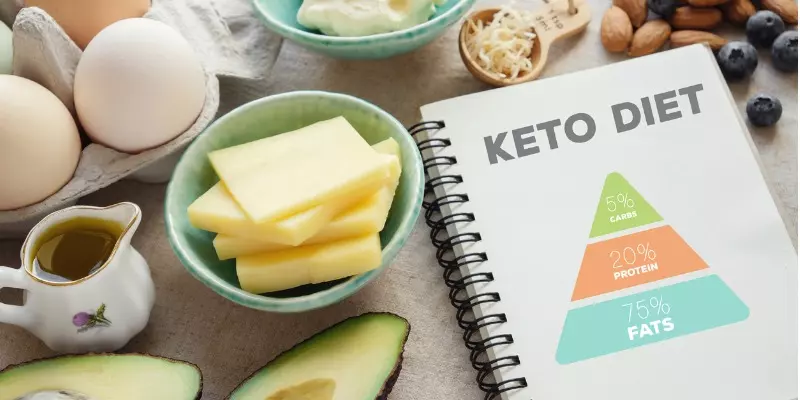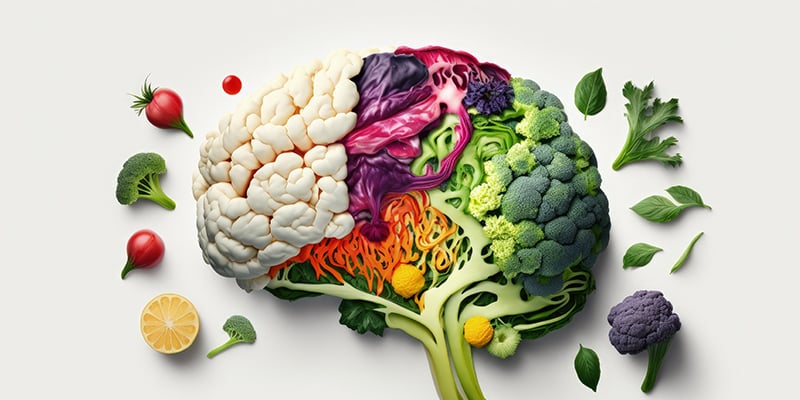
In 2020, The BMJ published a study exploring the role diet and nutrition play in mental health, with the lead authors stating, “Poor nutrition may be a causal factor in the experience of low mood, and improving diet may help to protect not only the physical health but also the mental health of the population.” In other words, food matters when it comes to mental health.
Diets high in sugar increase inflammation, cause fatigue and cravings, and lead to erratic brain cell firing that has been implicated in aggression. Click To Tweet
Unfortunately, a number of foods and food ingredients, common in the standard American diet, are toxic for mental health. They can harm your brain, and put you at increased risk for brain and mental health conditions such as depression, ADD/ADHD, anxiety disorders, and dementia. Awareness of the following toxic foods can help you to avoid what increases mental health problems and choose brain healthy foods instead!
6 TOXIC FOODS THAT FUEL MENTAL HEALTH ISSUES
1. Sugar and Refined Carbohydrates
Often when we feel bad, we crave sugary sweetness. We love the comfort sweet foods provide, but they don’t love us back. Sugar (and even natural honey and maple syrup), as well as refined carbohydrates (white bread, pastries, pasta, and crackers), cause blood sugar levels to spike and then drop, impacting your mood and sense of wellbeing. Diets high in sugar increase inflammation, cause fatigue and cravings, and lead to erratic brain cell firing that has been implicated in aggression, a 2021 study indicates. Another recent study showed increased markers of preclinical Alzheimer’s disease (lower overall brain and hippocampal volume, poorer episodic memory, and cognitive decline) associated with regular consumption of sugary beverages. Read labels carefully to avoid added sugars, and beware of its many names.
2. Mercury in Top Predatory Fish
While fish is normally a very healthy food, some fish are very high in mercury and should be avoided. Mercury, a known neurotoxin, makes its way up the food chain and can collect in harmful amounts in top predatory fish. Mercury can damage the brain and nerves. A study published in 2017 found an association between mercury exposure and neurological distress, mood changes, and difficulty regulating emotions, as well as gastrointestinal disruptions. Inflammation in the gut is directly linked to central nervous system disruption and mental health issues including anxiety and depression, according to research.
Because of their high mercury content, king mackerel, shark, swordfish and tilefish are on the “do not eat” list created by the U.S. Food and Drug Administration and the Environmental Protection Agency.
3. Artificial Sweeteners
Surprisingly, artificial sweeteners—including aspartame (NutraSweet, Equal), saccharin (Sweet’N Low), and sucralose (Splenda)—can lead to chronically elevated insulin levels, according to studies, which raises your risk for depression, Alzheimer’s disease, heart disease, diabetes, and other health problems. And they are associated with metabolic syndrome and may contribute to obesity, research shows, which can both play a role in mental health issues.
Aspartame appears to be particularly egregious as research has separately linked it to behavioral and cognitive problems, as well as neurophysiological symptoms such as learning problems, headache, seizure, migraines, irritable moods, anxiety, depression, and insomnia.
Additionally, for people with chronic digestive inflammatory disorders, evidence suggests that artificial sweeteners may induce pro-inflammatory changes in gut bacteria and gut wall immune reactivity, which, as mentioned above, can play a role in depression, anxiety, and other mental health disorders.
4. Pesticide-Laden Fruits and Vegetables
While fruits and vegetables are critical to vibrant health, some conventionally grown produce has residue of different types of pesticides that we ingest, which can cause ill mental health effects. According to testing conducted by the Environmental Working Group, the most pesticide-laden fruits and veggies for 2021 (known as the “Dirty Dozen”) include strawberries; spinach; kale, collard, and mustard greens; nectarines; apples; grapes; cherries; peaches; pears; bell and hot peppers; celery; and tomatoes.
One recent study suggests that low levels of pesticide exposure can affect young children’s neurological and behavioral development, showing a link between pesticides and neonatal reflexes, psychomotor and mental development, and ADHD.
5. Monosodium Glutamate (MSG)
MSG may be an FDA-approved flavor enhancer, it is also a type of excitatory neurotoxin (excitotoxin) that has been shown to adversely affect the brain. It is required to be noted as an ingredient on food labels, but often goes undetected when it is listed as glutamic acid, hydrolyzed protein, autolyzed protein, autolyzed yeast extract, or textured protein.
Excitotoxins are substances, usually amino acids, that overstimulate neuron receptors. Upon excitotoxin exposure, neurons fire more rapidly than normal. This process, if prolonged, can exhaust and weaken neurons, resulting in neuronal death. Don’t underestimate their effects. The electrical activity from excitotoxins like MSG can change the activity of the brain and can be associated with temper outbursts, depression, suicidal thoughts, panic attacks, distractibility, and confusion—what Amen Clinics calls “mind storms.”
6. Gluten
Gluten is the general name given for the proteins found in wheat, rye, barley, and triticale (a cross between wheat and rye) and is increasingly a problem for people who have a sensitivity to it. The Center for Celiac research reports that approximately 18 million Americans have gluten sensitivity. It is associated with autoimmune conditions such as celiac disease, Type 1 diabetes, and Hashimoto’s thyroiditis. One review study found that gluten sensitivity and celiac disease are related to a number of brain health/mental health issues, including anxiety disorder, depression, mood disorders, ADD/ADHD, autism spectrum disorders, and schizophrenia.
Studies show that a gluten-free diet has been associated with improvements in people who have mental health conditions. Specifically, one study found a decrease of symptoms in a set of patients with schizophrenia. And going gluten-free produced a decrease in symptoms in some people in a study on autism, research on ADD/ADHD, and a review study on depression.
Diet Is Powerful
While we’ve highlighted a few toxic foods for mental health, there are more, and this field of examination is evolving. Foods that produce allergic reactions such as soy, corn, and milk products may increase mental health problems. Other food additives, such as Red Dye #40, have been shown to have negative effects. Stay informed, read labels, and pay attention to how you feel
Mental health problems can’t wait. At Amen Clinics, we’re here for you. We offer in-clinic brain scanning and appointments, as well as mental telehealth, clinical evaluations, and therapy for adults, teens, children, and couples. Find out more by speaking to a specialist today at 888-288-9834 or visit our contact page here.





Thank you for a great article.
Comment by Timothy Lee — December 27, 2021 @ 4:11 AM
This was very informative newsletter, but a follow up with what is ok to eat would be good since this list eliminates a large amount of ingredients.
Comment by Susan Bruegman — December 27, 2021 @ 4:44 AM
respecto al punto 4, quedo con evidentes dudas, ya que, siempre se dice que se debe comer mucha verdura y fruta, favor aclarar eso.
Comment by SANTIAGO HERRERA ALLENDE — December 27, 2021 @ 4:52 AM
Years ago I used the macrobiotic diet for 6months. And it resolved my fatigue, depression and anxiety. It is difficult to do but well with the effort.
Comment by Karen A — December 27, 2021 @ 5:10 AM
Dear Dr. Amen
Thank you for the valuable information you always provide us!!
Comment by Blanca — December 27, 2021 @ 7:40 AM
What about certified and labeled organic fruits and vegetables. Do they have the same toxic effect as non organic fruits and vegetables. Please advise. Thanks.
Comment by Laurice E Smith — December 27, 2021 @ 8:44 AM
I really enjoy your articles. Thank you.
Comment by Dr. Mary Helen Lechuga — December 27, 2021 @ 8:54 AM
I have COPD stage four
I have been in the hospital twice since the virus started
When I went in the hospital
I was on a purée diet
And my breathing got better and I gained weight
Since I’ve been home
I’ve stayed on the purée diet
Different kinds of chunky soups
Put in the blender
Is that good for me
Thanks for all your time and attention on this matter
Comment by Linda Lambert — December 27, 2021 @ 9:19 AM
A challenge to enlist the warnings given for the fruits and vegetables.
Therefore, I have a question: Will organic versions of these listed be graded as healthy.
Comment by Kathy — December 27, 2021 @ 10:20 AM
My 40 year old son has had a brain injury, and ever since has heard voices and been institutionalized twice. I live on a very low SS income, and he is working sporadically, at lower paying jobs. Does the Amen clinic in Bellevue, Wa have a payment plan? Family has agreed to help.
Comment by Ruth Nevins — December 27, 2021 @ 11:03 AM
Thank you so much. Will try to avoid these.
Comment by Lynn Hock-Napoli — December 27, 2021 @ 12:10 PM
Thank you for your very informative articles, Dr. Amen. Much appreciated!
Comment by Chris Burrett — December 27, 2021 @ 12:32 PM
Hello Ruth, thank you for reaching out about your son. We would be happy to contact you directly with more information regarding the pricing of getting your son into Amen Clinics Bellevue. We look forward to speaking with you soon.
Comment by Amen Clinics — December 27, 2021 @ 2:15 PM
Very interesting article thankyou
Comment by Yvonne — December 28, 2021 @ 4:17 AM
My son had convulsions problems when he was almost 2 years old… the doctor who was taking care of him in Brazil medicated him a long time… it was very difficult on the beginning…. And the doctor told me that he needs medication for ADHD too… but I didn’t agree to give him so many poison drugs …. So now he is 28 years old and living on his on doing bad habits…. Who is making me so sad…. But I did my best for him…. So , I love to scan his brain and my brain….can I use my insurance for him, or if you can divide the payments…. He needs to wake up for live….he is making bad decisions on his live…. I love to help him… please help me! Thank you!
Comment by Marisa Worsley — December 28, 2021 @ 7:26 AM
This is a great article! It is very informative. Thanks for sharing.
Comment by Margaret — December 28, 2021 @ 7:35 AM
Great article but it would be nice to give us a sample of a good clean diet that will help us feel better and is good for our bodies and our brain
Comment by Toddyhawk — December 28, 2021 @ 11:19 AM
If the list of the dirty dozen for fruits what are the fruits safe to eat?
Comment by Paula Thompson — December 28, 2021 @ 8:05 PM
Hello Marisa, thank you for reaching out. We would be happy to reach out to you directly with more information regarding scheduling an appointment at one of our nine clinics for you and your son. We look forward to speaking with you soon.
Comment by Amen Clinics — January 5, 2022 @ 4:19 PM
This is great but with ADHD, Borderline Personality Disorder, and Bipolar Type 1 you tell me what I'm supposed to eat considering how many things I'm being told to cut from my diet…. I don't have a vehicle and half the time am debilitated by various symptoms and don't have a lot of money…. this is great information I cannot practically do anything with. So what about us?
Comment by Crystal Kornell — July 26, 2023 @ 4:35 AM
Spot on except Not gluten… Processed packaged bread. Home made bread homemade chapati no health problem. Please add preservatives such as sodium Benzoate. Also the preservative in bread may be linked to dementia.
Comment by Lisa — August 26, 2023 @ 12:26 AM
interesting article!
Comment by Doug Morris — August 28, 2023 @ 12:59 PM